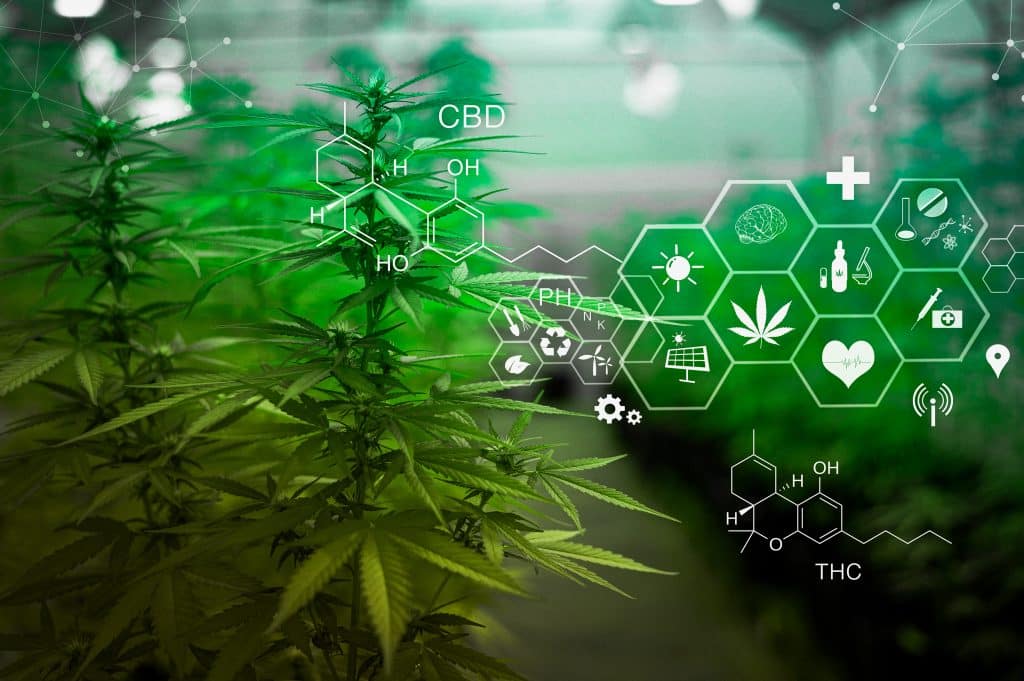Medical marijuana is a controversial topic, but also a promising one. Many people use cannabis for various health conditions, such as chronic pain, epilepsy, multiple sclerosis, and cancer. But what does science say about the benefits of medical marijuana? Let's review some of the general studies on the topic, and see what they have to say about the potential of cannabis as a medicine.
CBD and Drug Interactions

CBD, or cannabidiol, is one of the main components of cannabis, and it has many therapeutic effects. CBD can reduce inflammation, pain, anxiety, seizures, and more. However, CBD can also interact with other drugs, which can have both positive and negative consequences. For example, CBD can enhance the effects of some anti-epileptic drugs, but it can also reduce the effects of some anti-cancer drugs. Therefore, it is important to know how CBD affects the metabolism and activity of other drugs, and to consult with a doctor before using CBD with any medication.
A comprehensive review of the literature and clinical trials on CBD and drug interactions was published in 2017 by Kerstin Iffland and Franjo Grotenhermen. The review covers the pharmacokinetics, pharmacodynamics, and clinical implications of CBD and drug interactions, and provides some practical recommendations for CBD users and prescribers. The review also highlights the need for more research on this topic, as the current evidence is limited and sometimes contradictory.
Medical Cannabis Administration and Dosing

Medical cannabis can be administered in different ways, such as inhalation, oral, topical, or rectal. Each method has its own advantages and disadvantages, and requires careful monitoring and dosing. For example, inhalation can provide fast and precise relief, but it can also cause respiratory irritation and variability in absorption. Oral administration can provide long-lasting and consistent effects, but it can also cause delayed onset and unpredictable bioavailability. Topical and rectal administration can provide localized and systemic effects, but they can also cause irritation and discomfort.
A practical guide on how to use medical cannabis safely and effectively was published in 2018 by MacCallum and Russo . The guide offers suggestions on cannabis-drug interactions, patient monitoring, and standards of care, while addressing special cases for cannabis therapeutics, such as pediatric, elderly, and palliative patients. The guide also provides some general principles for cannabis dosing, such as starting low and going slow, titrating to effect, and adjusting for tolerance and adverse effects.
Cannabis Strains: Sativa vs. Indica vs. Reality

Cannabis is not a homogeneous plant, but rather a diverse group of strains with different biochemical profiles. These profiles determine the effects and benefits of each strain, and many factors, such as genetics, environment, cultivation, and processing influence them.
However, the common classification of cannabis into sativa and indica is not based on scientific evidence, but rather on folklore and marketing. Sativa and Indica are two types of cannabis plants, but they do not necessarily reflect the chemical composition or the effects of the strains derived from them.
A critical analysis of the sativa/indica distinction and its implications for medical use was published in 2016 by Piomelli and Russo. The analysis shows that the sativa/indica classification is unreliable and inconsistent and that it does not capture the complexity and diversity of cannabis strains. The analysis also proposes a more rational and informative approach to classify cannabis strains, based on their chemical and genetic profiles, as well as their pharmacological and clinical effects.
Beyond Cannabis: Plants and the Endocannabinoid System

Cannabis is not the only plant that can affect the endocannabinoid system, which is involved in many physiological and psychological processes, such as mood, memory, pain, appetite, and immune response. The endocannabinoid system is composed of endogenous cannabinoids, or endocannabinoids, which are produced by the body, and their receptors, which are found throughout the body.
Cannabis contains exogenous cannabinoids, or phytocannabinoids, which can mimic or modulate the effects of endocannabinoids. However, other plants, such as echinacea, black pepper, and chocolate, also contain compounds that can stimulate, antagonize, or modulate different aspects of the endocannabinoid system.
A review of the plants and their endocannabinoid effects was published in 2016 by Russo. The review explores the diversity and potential of plant cannabinoids, and how they can interact with the endocannabinoid system in different ways. The review also discusses the therapeutic applications and challenges of plant cannabinoids, and how they can complement or enhance the effects of cannabis.
The Entourage Effect: How Terpenes Enhance Cannabinoids

Cannabis contains not only cannabinoids but also terpenes, which are aromatic compounds that give cannabis its distinctive smell and flavor. Terpenes can also have therapeutic effects, such as anti-inflammatory, anti-anxiety, anti-depressant, and anti-cancer properties.
Moreover, terpenes can enhance or modify the effects of cannabinoids, by influencing their absorption, distribution, metabolism, and receptor binding. This phenomenon is known as the entourage effect, and it offers a promising avenue for developing new cannabis-based products that can target specific conditions and symptoms.
A review of the terpenes and their entourage effects was published in 2011 by Russo. The review describes the chemistry and pharmacology of the major terpenes found in cannabis, such as myrcene, limonene, pinene, linalool, and beta-caryophyllene. The review also provides examples of how terpenes can modulate the effects of cannabinoids, such as THC and CBD, and how they can synergize with them to produce greater benefits.
CBD and Sports Performance

CBD can have beneficial effects on sports performance, by reducing inflammation, pain, anxiety, and oxidative stress. CBD can also improve sleep quality, mood, and recovery. However, CBD is not a miracle drug, and it can also have some side effects and legal issues.
For example, CBD can cause drowsiness, dry mouth, diarrhea, and changes in appetite. CBD can also interact with some medications, supplements, and hormones. Moreover, CBD can be contaminated with THC or other substances, which can result in positive drug tests or adverse reactions.
A narrative review of the effects of CBD on sports and exercise was published in 2020 by McCartney and colleagues (). The review explores the various physiological and psychological effects of CBD that may be relevant to the sport and/or exercise context, such as pain, inflammation, muscle damage, oxidative stress, anxiety, sleep, cognition, and addiction. The review also discusses the safety, legality, and quality of CBD products, and the challenges and opportunities for future research and practice.
The CB1 Receptor and Body Weight Disorders

The CB1 receptor is one of the main targets of cannabinoids in the brain, and it is involved in the regulation of appetite, metabolism, and body weight. The activation of the CB1 receptor by THC, the main psychoactive component of cannabis, can increase food intake and body weight, which can be beneficial for some conditions, such as wasting syndrome and anorexia nervosa.
However, the chronic activation of the CB1 receptor by THC can also cause obesity and metabolic syndrome, which can increase the risk of diabetes, cardiovascular disease, and cancer. Therefore, some drugs that act on the CB1 receptor can have anti-obesity effects, by reducing food intake, increasing energy expenditure, and improving metabolic parameters.
A review of the studies on the CB1 receptor and body weight disorders was published in 2020 by Murphy and Le Foll (). The review covers the preclinical and clinical evidence of the effects of various cannabinoid CB1 drugs, such as rimonabant, taranabant, and ibipinabant, on body weight and related outcomes. The review also highlights the limitations and challenges of these drugs, such as their psychiatric side effects, their lack of efficacy in some populations, and their regulatory hurdles.
CBD and Cardiomyopathy

CBD can also have cardioprotective effects, by reducing blood pressure, arrhythmias, inflammation, and fibrosis. CBD can also improve cardiac function and survival in animal models of cardiomyopathy and heart failure. Cardiomyopathy is a disease of the heart muscle, which can impair its ability to pump blood and cause heart failure.
Heart failure is a condition in which the heart cannot meet the body’s needs for blood and oxygen, and it can cause symptoms such as fatigue, shortness of breath, and swelling. Heart failure is a major cause of morbidity and mortality worldwide, and it has limited treatment options.
A review of the studies on the therapeutic applications of cannabinoids in cardiomyopathy and heart failure was published in 2020 by Garza-Cervantes and colleagues.
This study summarizes the current knowledge and mechanisms of the effects of CBD and other cannabinoids on cardiomyopathy and heart failure, and provides some perspectives and recommendations for future research and clinical trials. The review also emphasizes the safety and potential of CBD as a compound with great potential to treat a variety of heart diseases.
Cannabis and cannabinoids are widely used for various medical purposes, especially for the treatment of pain. Pain is a complex and multifaceted phenomenon, which can have physical, psychological, and social impacts. Pain can be acute or chronic, nociceptive or neuropathic, inflammatory or non-inflammatory, and it can affect different parts of the body and different systems.
Pain can also be associated with other conditions, such as cancer, arthritis, fibromyalgia, migraine, and multiple sclerosis. Pain can be difficult to treat, and it can cause significant suffering and disability.
Cannabis and cannabinoids can offer some advantages over conventional pain medications, such as opioids, non-steroidal anti-inflammatory drugs (NSAIDs), and antidepressants. Cannabis and cannabinoids can have multiple and synergistic mechanisms of action, which can target different types of pain and different pathways.
Below, we will review some of the most recent and relevant studies on the therapeutic benefits of cannabis/cannabinoids, especially in the treatment of pain.
Therapeutic Benefits of Cannabis/Cannabinoids in Treatment of Pain

According to a study published by Eric Baron, evidence for various therapeutic benefits of cannabis/cannabinoids, especially in the treatment of pain, and may assist in opioid detoxification.
Cannabis Helps Patients Save Money on Pain Treatment

After 3 months of treatment, cannabis has been shown to improve the quality of life, reduce pain and opioid use, and lead savings in medical expenses otherwise spent on other treatment plans. This claim is backed up by a study done by Belliner, Brown, and Ortega.
Cannabis is an Alternative to Opioids

Medical cannabis laws may be associated with a reduction in the number of opioid prescriptions filled by Medicare and Medicaid. If you look more closely at the data, you see that there are suggestions that opioid analgesics are among the drug classes that are most affected by this decline.
In addition, another study showed that patients tend to decrease use of opiates after switching their treatment to cannabis. Ninety-seven percent of the sample studied “strongly agreed/agreed” that they are able to decrease the amount of opiates they consume when they also use cannabis.
Studies Confirm That Medical Cannabis Can Alleviate Pain

Furthermore, it is worth noting that various studies have confirmed that cannabis can be used to alleviate pain. It can be an efficacious tool, then, to make more effective the management of chronic pain and its consequences on functional and psychological dimension.
Modern Israeli Pain Specialists Agree

It's not just us saying that cannabis is a great way to help alleviate issues with chronic pain! Pain clinicians in Israel with vast experience in prescribing cannabis over prolonged periods view it as an effective and relatively safe treatment for chronic pain.
Cannabis is Great For Spinal Cord Stimulation For Treatment of Failed Back Surgery

Furthermore, work has been done on the impacts of cannabis after a failed back surgery. The results indicate that cannabinoid agonists (THC/CBD) can have remarkable analgesic capabilities after failed back surgery. This gives patients another way to get quick relief when life hits them right in the spine.
Treatment of Migraines and Headache Disorders Using Cannabis

Some preliminary studies have been done that indicate a potential connection between treating migraines and headaches using cannabis. In addition, that cannabis may lower the symptom intensity. There are sufficient anecdotal and preliminary results, as well as plausible neurobiological mechanisms, to warrant properly designed clinical trials.
Cannabidiol Prevents Pain and Nerve Damage in Rat Osteoarthritis

Another interesting development is how CBD can prevent pain and nerve damage in rat osteoarthritis. The data presented here indicate by Philpott, O'Brien, and McDougall indicates that local administration of CBD blocked OA pain. Prophylactic CBD treatment prevented the later development of pain and nerve damage in these OA joints.
Fibromyalgia is a chronic condition that causes widespread pain, fatigue, sleep problems, and cognitive difficulties. Fibromyalgia affects millions of people worldwide, and it can have a significant impact on their quality of life and well-being. Fibromyalgia is difficult to diagnose and treat, and there is no cure for it.
Fibromyalgia patients often rely on various medications, such as opioids, antidepressants, and anticonvulsants, to manage their symptoms, but these medications can have limited effectiveness and serious side effects. Cannabis is a natural plant that contains many compounds, such as cannabinoids and terpenes, that can interact with the body’s endocannabinoid system, which is involved in regulating pain, mood, sleep, and inflammation.
Cannabis can offer some benefits for fibromyalgia patients, such as reducing pain, improving sleep, enhancing mood, and relieving stress. Cannabis can also help fibromyalgia patients reduce their use and dependence on opioids and other medications, and improve their overall quality of life.
Below, we will review some of the recent and relevant studies that have investigated the use and effects of cannabis for fibromyalgia patients. We will also discuss some of the challenges and limitations of using cannabis for fibromyalgia, and some of the future directions and opportunities for research and practice.
Cannabis Use for Fibromyalgia in Israel: A Survey Study

Cannabis is legal for medical use in Israel, and many fibromyalgia patients use cannabis to treat their condition. A survey study by Habib and Avisar examined the prevalence, patterns, and effects of cannabis use among 383 fibromyalgia patients in Israel.
The study found that 81% of the patients reported using cannabis, and 85% of them obtained it with a medical license. The study also found that the average amount of cannabis used was 26 grams per month, and the average duration of use was 32 months. The study also found that cannabis use was associated with favorable effects on pain, sleep, depression, and anxiety, and few adverse effects or feelings of dependence.
The study concluded that cannabis use is very common and effective among fibromyalgia patients in Israel, and that it should be considered as a therapeutic option for them.
Ingestion of a THC-Rich Cannabis Oil in People with Fibromyalgia: A Randomized Controlled Trial

Cannabis can be consumed in different ways, such as smoking, vaping, or eating. Cannabis oil is a concentrated extract of cannabis that can be ingested orally, and it can contain different amounts of THC, the main psychoactive component of cannabis, and CBD, the main non-psychoactive component of cannabis.
A randomized controlled trial by Chaves and colleagues compared the effects of ingesting a THC-rich cannabis oil, with 24 mg of THC and 0.9 mg of CBD per dose, or a placebo oil, on 17 fibromyalgia patients. The trial lasted for eight weeks, and the patients were assessed for pain, sleep, quality of life, and adverse effects.
The trial found that the cannabis oil group had a significant decrease in the Fibromyalgia Impact Questionnaire (FIQ) score, which measures the overall impact of fibromyalgia on physical and mental health, compared with the placebo group. The trial also found that the cannabis oil group had a significant improvement in sleep quality, and no serious adverse effects. The trial suggested that ingesting a THC-rich cannabis oil can be an effective and safe treatment for fibromyalgia patients.
Medical Cannabis for the Treatment of Fibromyalgia: A Systematic Review and Meta-Analysis
Cannabis can be used for medical purposes, and it can be prescribed by doctors or authorized by health authorities in some countries. Medical cannabis can have different formulations and compositions, and it can be obtained from different sources, such as pharmacies, dispensaries, or home cultivation.
A systematic review and meta-analysis by Mazza evaluated the efficacy and adverse events of short- and long-term medical cannabis treatment for fibromyalgia. The review included 12 studies, with a total of 1,248 fibromyalgia patients, and assessed the outcomes of pain, sleep, quality of life, and adverse events.
The review found that medical cannabis treatment was associated with a moderate reduction in pain, a large improvement in sleep, and a small improvement in quality of life, compared with placebo or conventional treatment. The review also found that medical cannabis treatment was associated with a low risk of adverse events, such as dry mouth, drowsiness, and euphoria. The review concluded that medical cannabis treatment can be an efficacious and well-tolerated option for fibromyalgia patients.
Medical Marijuana & Fibromyalgia: Final Thoughts
Cannabis can help fibromyalgia patients by reducing their pain, improving their sleep, enhancing their mood, and relieving their stress. Cannabis can also help fibromyalgia patients reduce their use and dependence on opioids and other medications, and improve their overall quality of life. However, cannabis is not a simple or straightforward solution, and it can have different effects and interactions depending on the strain, the method, the dose, and the individual. Therefore, it is important to consult with a doctor and a qualified cannabis provider before using cannabis, and to use it responsibly and legally.
Cannabinoid pharmacology and therapy in gut disorders
Cannabis has a long history for use as a remedy for symptoms related with gastrointestinal diseases.

Cannabis in liver disorders
cannabidiol and Δ-tetrahydrocannabinol, have shown anti-inflammatory, antioxidant, and hepatoprotective effects.

Anti-Inflammatory Activity in the colon with THCA use Inflammatory bowel diseases (IBDs) include Crohn’s disease, and ulcerative colitis. Cannabis sativa preparations have beneficial effects for IBD patients.
Colorectal Cancer

C. sativa compounds interact synergistically for cytotoxic activity against colon cancer cells and induce cell cycle arrest, apoptotic cell death, and distinct gene expression.
Cannabis link to relieving intestinal inflammation explained:

Why cannabis users report that the drug reduces the symptoms of inflammatory bowel disease (IBD).
University of Massachusetts Medical School. “Cannabis link to relieving intestinal inflammation explained.”
Medical Marijuana and Rheumatoid Arthritis

Medical marijuana has proven to be an effective treatment for rheumatoid arthritis.
Cannabidiol prevents pain and nerve damage in rat osteoarthritis: The data presented here indicate that local administration of CBD blocked OA pain. Prophylactic CBD treatment prevented the later development of pain and nerve damage in these OA joints.
Medical Cannabis – A Source for a New Treatment for Autoimmune Disease?

Cannabis as an immunomodulator and its potential as a new treatment option for autoimmune diseases such as diabetes type I and rheumatoid arthritis.
Self-reported cannabis use and biomarkers of inflammation among adults in the United States

Self-reported cannabis use, particularly cannabis use within the past 30 days, was associated with lower levels of each biomarker of systemic inflammation
A Systematic Review With Meta-Analysis of the Efficacy of Cannabis and Cannabinoids for Inflammatory Bowel Disease
Cannabi(noid)s do not induce clinical remission or affect inflammation in IBD patients. However, cannabi(noid)s significantly improve patient-reported symptoms and QoL.
CBD and PTSD

recent studies have confirmed the ability of CBD to alter important aspects of aversive memories in humans and promote significant improvements in the symptomatology of PTSD.
Veterans using Cannabis Medically versus Recreationally

Veterans who use cannabis for medicinal purposes differ significantly in sleep, physical and mental health functioning than veterans who use cannabis for recreational purposes.
Cannabis and Cannabinoids in the threatment of PTSD

The effects of cannabis and cannabinoids in PTSD and the preclinical and clinical literature on the effects of cannabinoids and endogenous cannabinoid signaling systems.
CBD’s ability to reduce fear memories and drug memories (substance abuse)

Understanding how cannabidiol regulates emotion and emotional memory processing may eventually lead to its use as a treatment for anxiety-related and substance abuse disorders.
A user’s guide to cannabinoid therapies in oncology
Patients with malignant disease, at all points of their disease trajectory, could be candidates for cannabinoid therapies whether as monotherapies or as adjuvants.
Cannabinoids for Symptom Management and Cancer Therapy
Pain, nausea, anti-cancer potential of cannabis.
Colorectal Cancer
C. sativa compounds interact synergistically for cytotoxic activity against colon cancer cells and induce cell cycle arrest, apoptotic cell death, and distinct gene expression.
Cannabinoid Regulation of Acute and Anticipatory Nausea
Pre-clinical evidence points to a compelling need to evaluate the antinausea potential of cannabidiol, cannabidiolic acid, and related treatments.
Cannabidiol-induced apoptosis in human colorectal cancer cells
CBD treatment in vivo, confirming its role as a novel, reliable anticancer drug.
The pro-apoptosis effects of Echinacea purpurea and Cannabis sativa extracts in human lung cancer cells through caspase-dependent pathway
Increasing concentrations of Cannabis sativa (CS) induced A549 cell death in a time-dependent manner, followed by induction of early apoptosis, cell cycle arrest at sub G1 phase, elevation of ROS level, and activation of caspase 3
Efficacy of cannabinoids against glioblastoma multiforme
To determine whether cannabinoids alone or in combination with radiotherapy and/or chemotherapy inhibit tumour progression, induce cancer cell death, inhibit metastasis and invasiveness and the mechanisms that underlie these actions.
Safety and effectiveness of medical cannabis as a complementary option for supportive cancer care
The Cannabis Pilot Project (CPP) was implemented at the Cedars Cancer Centre of the McGill University Health Centre to evaluate MC as a complementary option for symptom control in SCC.
Cannabinoid Effects on Experimental Colorectal Cancer Models Reduce Aberrant Crypt Foci (ACF) and Tumor Volume: A Systematic Review
Cannabinoids might be substances with possible therapeutic potential for cancer because they can attenuate the side effects of chemotherapy and have antiproliferative and antimetastatic effects.The management of anorexia and weight loss in AIDS and cancer:
Dronabinol exerts its effects by directly acting on the vomiting and appetite control centers in the brain, which in turn increases appetite and prevents vomiting.
HCV–HIV co-infected patients with progression of hepatic fibrosis:
Marijuana use did not increase the prevalence or progression of hepatic fibrosis in HCV and HCV–HIV-coinfected patients. Therapeutic use of medicinal cannabis in difficult to manage epilepsy:
Large review of Epilepsy Studies: cannabinoids as adjunctive treatments for treatment-resistant epilepsy.
CBD for treatment of autism spectrum disorder:
available pre-clinical and clinical data regarding the safety and effectiveness of medical cannabis, including CBD, in young ASD patients.
Practical Experiences using CBD for Epilepsy:
with concomitant use of clobazam and interactions for seizure reduction.
CBD in the Treatment of Refractory Epilepsy:
Results suggest that adding CBD to the treatment of patients with refractory epilepsy may result in a significant reduction in seizure frequency.
The completion of three high-quality placebo-controlled adjunctive-therapy trials:
There is now class 1 evidence that adjunctive use of CBD improves seizure control in patients with specific epilepsy syndromes.
Cannabidiol Study on Dravet Syndrome:
Results provide critical preclinical evidence supporting treatment of epilepsy and autistic-like behaviors linked to DS with CBD.
CBD in Treatment-Resistant Epilepsy:
investigated if there is any difference in efficacy between CBD-rich extracts compared to purified CBD products.
Correction of Autism-Related Social Impairment:
the endocannabinoid anandamide mediates the action of oxytocin, a neuropeptide that is crucial for social behavior, to control social reward. Oxytocin signaling has been implicated in autism spectrum disorder.
Cannabidiol or CBD Oil: Help, Hope, and Hype for Psychiatric and Neurologic Conditions
This article presents proven, promising, and potential therapeutic uses for cannabidiol (CBD) in the treatment of psychiatric and neurologic conditions and diseases.
Medical cannabis preparation in a monocentric series of young patients with drug resistant epilepsy
The present study, although with some limitations, shows a good safety profile of medical cannabis in children and young patients with drug-resistant epilepsy and encourages the possibility of further studies with oral cannabis-based drugs.
Cannabidiol-enriched oil in children and adults with treatment-resistant epilepsy-does tolerance exist?
To evaluate the long-term effectiveness of cannabidiol (CBD)-enriched oil for the treatment of refractory epilepsy and to assess the development of tolerance to its anti-seizure effect.
Cannabinoids for People with ASD: A Systematic Review of Published and Ongoing Studies
Among other biological hypotheses, researchers have evidenced an imbalance in the endocannabinoid (eCB) system, which regulates some functions typically impaired in ASD, such as emotional responses and social interaction. CARE-E) study: a phase 1 dosage escalation study: A trial of CBD in children with treatment-resistant epileptic encephalopathy.
CBD for treatment of autism spectrum disorder:
available pre-clinical and clinical data regarding the safety and effectiveness of medical cannabis, including CBD, in young ASD patients.
Cannabidiol-Rich Cannabis in Children with Autism Spectrum Disorder: Following the cannabis treatment, behavioral outbreaks were much improved or very much improved in 61% of patients.
Marijuana Use in Pregnancy and While Breastfeeding:
Marijuana use may be associated with growth restriction, stillbirth, spontaneous preterm birth, and neonatal intensive care unit admission.
Metz TD, Borgelt LM. https://www.ncbi.nlm.nih.gov/pubmed/30234728
Review of the Science in developmental-behavioral pediatrics: Risks and benefits for the proposed uses of cannabis in developmental and behavioral conditions, including attention-deficit hyperactivity disorder and autism spectrum disorder.
Hadland SE, Knight JR, Harris SK.
https://www.ncbi.nlm.nih.gov/pubmed/25650954
Highly Purified Cannabidiol for Epilepsy Treatment: A Systematic Review of Epileptic Conditions Beyond Dravet Syndrome and Lennox–Gastaut Syndrome
The currently available data suggest that response to treatment with a highly purified, plant-derived CBD oil-based solution can be seen in patients across a broad range of epilepsy disorders and etiologies.
Simona Lattanzi, Eugen Trinka,Pasquale Striano, Chiara Rocchi, Sergio Salvemini, Mauro Silvestrini, Francesco Brigo
https://link.springer.com/article/10.1007/s40263-021-00807-y Parkinson’s and other Neuronal Diseases: the structure-activity relationship (SAR) of cannabinoid compounds able to bind to cannabinoid receptors and act as therapeutic agents in neuronal diseases.
Prandi C, Blangetti M, Namdar D, Koltai H.
https://www.ncbi.nlm.nih.gov/pubmed/29941830
Neuroprotection by Cannabinoids in Huntington’s Disease: experimental evidence showed researchers that CBD aid neurons with its antioxidant properties.
Hospital Universitario Ramón y Cajal https://clinicaltrials.gov/ct2/show/NCT01502046
Effects of cannabidiol in Alzheimer’s disease: CBD suppresses, through activation of PPARγ, pro-inflammatory signaling and may be a potential new candidate for Alzheimer’s disease therapy.
Vallée A, Lecarpentier Y, Guillevin R, Vallée JN https://www.ncbi.nlm.nih.gov/pubmed/28981597
Parkinson’s, Dyskinesia and Movement Disorders: cannabidiol emerges as a promising compound to treat and/or prevent movement disorders.
Peres FF, Lima AC, Hallak JEC, Crippa JA, Silva RH, Abílio VC.
https://www.ncbi.nlm.nih.gov/pubmed/29867488
Chronic Neuropathic Pain: THC significantly reduced patients’ pain compared to placebo. THC-induced analgesia was correlated with a reduction in functional connectivity between the anterior cingulate cortex (ACC) and the sensorimotor cortex.
Libat Weizman, Lior Dayan, Silviu Brill, Hadas Nahman-Averbuch, Talma Hendler, Giris Jacob, Haggai Sharon http://n.neurology.org/content/early/2018/09/05/WNL.0000000000006293
Medicinal Cannabinoids in Patients With Multiple Sclerosis: efficacy of cannabinoids for the treatment of spasticity, pain, and bladder dysfunction in patients with MS.
Mari Carmen Torres-Moreno, PhD; Esther Papaseit, MD, PhD; Marta Torrens, MD, PhD
https://jamanetwork.com/journals/jamanetworkopen/fullarticle/2706499
THCCBD oromucosal spray for treating resistant multiple sclerosis spasticity: significantly more effective than readjusting standard antispasticity therapy and provided new evidence of efficacy.
Jolana Marková
https://www.futuremedicine.com/doi/full/10.2217/nmt-2018-0050
Cannabinoid receptor as a potential therapeutic target for Parkinson’s Disease: the role of cannabinoid receptors (CBRs) in curtailing the progression of PD by activating neuroprotective pathways.
Himadri Shekhaar Baul, Ceera Manikandan, Dwaipayan Sen
https://www.futuremedicine.com/doi/full/10.2217/nmt-2018-0050
Cannabinoids in multiple sclerosis: A neurophysiological analysis
To investigate the action of cannabinoids on spasticity and pain in secondary progressive multiple sclerosis, by means of neurophysiological indexes.
Domizia Vecchio, Claudia Varrasi, Eleonora Virgilio, Antonio Spagarino, Paola Naldi, Roberto Cantello
https://onlinelibrary.wiley.com/doi/abs/10.1111/ane.13313
Attenuation of Oxidative Stress by Cannabinoids and Cannabis Extracts in Differentiated Neuronal Cells
THC had a high potency to combat oxidative stress. The cannabis extracts also exhibited a significant antioxidant activity.
Aruna Raja, Soha Ahmadi, Fernanda de Costa, Nan Li and Kagan Kerman
https://www.mdpi.com/1424-8247/13/11/328
The Effect of Cannabis on the Clinical and Cytokine Profiles in Patients with Multiple Sclerosis
Cannabis may have a positive impact on the cytokine and clinical profiles in cases with multiple sclerosis.
Wessam Mustafa, Nadia Elgendy, Samer Salama, Mohamed Jawad, and Khaled Eltoukhy
https://www.hindawi.com/journals/msi/2021/6611897/
Medical marijuana used by persons with multiple sclerosis (PWMS) to treat a broad range of neurological symptoms
A significant proportion of respondents had stopped or reduced prescription medications (86% vs. 55%, p<0.001) as a function of finding cannabis more effective than prescription medications.
J.B. Guarnaccia, A. Khan, R. Ayettey, J.A. Treu, B. Comerford, V.Y. Njike
https://www.msard-journal.com/article/S2211-0348(21)00096-1/fulltext
Spinal astroglial cannabinoid receptors control pathological tremor
Cannabinoids reduce tremor associated with motor disorders induced by injuries and neurodegenerative disease.
Eva Maria Meier Carlsen, Sarah Falk, Urszula Skupio, Laurie Robin, Antonio C. Pagano Zottola, Giovanni Marsicano and Jean-François Perrier
https://doi.org/10.1038/s41593-021-00818-4
Medical Marijuana for Depression, Bipolar Disorder and Anxiety: unlike medical marijuana for chronic, debilitating pain, there’s a lot of additional factors that must be taken into account when studying mental illness and a psychoactive substance like marijuana.
John M. Grohol, Psy.D. https://psychcentral.com/blog/medical-marijuana-for-depression-bipolar-disorder-anxiety-mental-illness-can-it-help/
Medical Marijuana for Psychiatric Disorders: clinicians can feel increasingly comfortable utilizing this medication for very specific psychiatric disorders.
Jeremy Spiegel M.D. https://www.psychologytoday.com/us/blog/mind-tapas/201303/medical-marijuana-psychiatric-disorders
Biphasic effects of THC in memory and cognition: THC paradoxically promotes hippocampal neurogenesis, prevents neurodegenerative processes occurring in animal models of Alzheimer’s disease.
Calabrese EJ, Rubio-Casillas A https://www.ncbi.nlm.nih.gov/pubmed/29574698
CBD’s ability to reduce fear memories and drug memories (substance abuse) : Understanding how cannabidiol regulates emotion and emotional memory processing may eventually lead to its use as a treatment for anxiety-related and substance abuse disorders.
Lee JLC, Bertoglio LJ, Guimarães FS, Stevenson CW https://www.ncbi.nlm.nih.gov/pubmed/28268256
Marijuana use by middle-aged and older adults: Marijuana use is becoming more prevalent in this population and users are also at high risk for other drug use.
Han BH, Palamar JJ https://www.ncbi.nlm.nih.gov/pubmed/30197051
The antidepressant effect of cannabidiol: recent evidence suggests that CBD promotes both a rapid and a sustained antidepressant effect.
Silote, Gabriela, Sartim, Ariandra Guerini, Sales, Amanda J Eskelund, Amanda, Guimarães, Francisco S, Wegener, Gregers, Joca, Sâmia
http://www.forskningsdatabasen.dk/en/catalog/2443061455
Effectiveness of Raw, Natural Medical Cannabis Flower for Treating Insomnia:
Consumption of medical Cannabis flower is associated with significant improvements in perceived insomnia.
Vigil JM, Stith SS, Diviant JP, Brockelman F, Keeling K, Hall B https://www.ncbi.nlm.nih.gov/pubmed/29997343
Cannabis, Cannabinoids, and Sleep: Preliminary research into cannabis and insomnia suggests that cannabidiol (CBD) may have therapeutic potential for the treatment of insomnia.
Babson KA, Sottile J, Morabito D. https://www.ncbi.nlm.nih.gov/pubmed/28349316
With more approved conditions per capita, no wonder seniors are the fastest growing demographic in the use of cannabis for medical use.
Alzheimer’s
Destabilization of the Alzheimer’s amyloid-β protofibrils by THC
The destabilization of the protofibrils by the THC molecules leads to the conclusion that THC molecules may be considered for the therapy in treating Alzheimer’s disease.
Pavan KrishnaKanchi, Ashok KumarDasmahapatra
https://www.sciencedirect.com/science/article/abs/pii/S1093326321000589
As of last year, Autism is now an approved condition in Colorado as an alternative treatment option.






























